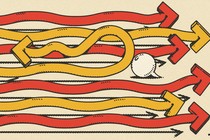Trump’s Lie Is Another Test for Christian America
4 min read
The accusation that Haitian immigrants in a small Ohio city are abducting and eating their neighbors’ cats and dogs relies not on one falsehood but a web of them. The rhetoric evokes racist tropes about “savages” who do not conform to our civilized Western world. There’s also a religious angle: the idea that Haitian refugees are voodoo occultists who might be worshipping the devil. As an evangelical Christian who actually believes in the existence of Satan, I agree that we can indeed see the work of the devil at play here, only it’s not on the menu of the Haitian families but rather in the cruelty of those willing to lie about them.
There is little ambiguity about whether Springfield, Ohio, is a hellscape of raptured pets, held at the mercy of marauding refugees. Law enforcement has told the world that there’s no evidence of this behavior, and the mayor and governor have confirmed this. But in the social-media age, none of that matters against A friend I know there knew somebody who said that she knew somebody whose cat was gutted and hanging from a tree. Other conflict entrepreneurs, when asked to provide evidence, sound like a radical deconstructionist in a 1990s faculty lounge, appealing to the “larger reality” of immigrant crime that is so true that the facts of the particular case, even if shown to be untrue, are beside the point.
If this were just about the readiness of some Americans to believe grifters who want to keep them angry and scared, we could perhaps ignore it, putting it into the category of the friend from high school whose Facebook posts claim to have “the receipts” on the alien corpses the government is hiding from us in Roswell. This falsehood, though, was given voice by a former and perhaps future president of the United States in a televised debate and afterward. And the real-world consequences are chilling. The mayor of Springfield confirmed to reporters that elementary schools were evacuated in his town this week because of threats directly tied to lies about the Haitian community there.
When we are willing to see children terrorized rather than stop telling lies about their families, we should step back, forget about our dogs and cats for a moment, and ask who abducted our consciences. That’s especially true for those of us who, like me, claim to be followers of Jesus of Nazareth, who told us that on the Day of Judgment, “people will give account for every careless word they speak” (Mt 12:36).
The Bible’s Book of James tells us, “How great a forest is set ablaze by such a small fire! And the tongue is a fire, a world of unrighteousness” (Jas 3:5). The Bible goes on to say that the words we use for other people are not just rhetoric to be deployed against our would-be opponents. The words themselves reveal the moral state of our soul. Of our capacity for words, James wrote: “It is a restless evil, full of deadly poison. With it we bless our Lord and Father, and with it we curse people who are made in the likeness of God. From the same mouth come blessing and cursing. My brothers, these things ought not to be so” (Jas 3:8–10).
To sing praise songs in a church service while trafficking in the bearing of false witness against people who fled for their lives, who are seeking to rebuild a life for their children after crushing poverty and persecution, is more than just cognitive dissonance. It’s modeling the devil himself, whom Jesus called “the father of lies” (Jn 8:44). That’s especially true when the lies harm another person. “Everyone who hates his brother is a murderer,” the apostle John wrote, “and you know that no murderer has eternal life abiding in him” (1 Jn 3:15).
Christians have heard for years that we should be “values voters” who can hold the country back from immorality. On many moral issues, Americans of good will can bear with one another as we wrestle through how best to live up to what our conscience tells us is right. Even those of us who base our core principles on the Bible have many issues with much room for disagreement. The Bible tells us to care for the poor but doesn’t set a minimum wage. The Bible tells us to steward the Creation but doesn’t give us a policy paper on renewable energy. The Bible tells us the state should protect its people but doesn’t propose a Pentagon budget.
The cruelty to Haitian immigrants—and with it, the implicit incitement of potential violence—is not one of those debatable issues. And Christians do not need to struggle to figure out what Jesus would have us do here. If we see children sheltering at home because they fear violence, we know that’s wrong. And when we see that this fear comes from the incitement of hatred against those children because of where their parents came from, surely we can smell the brimstone.



